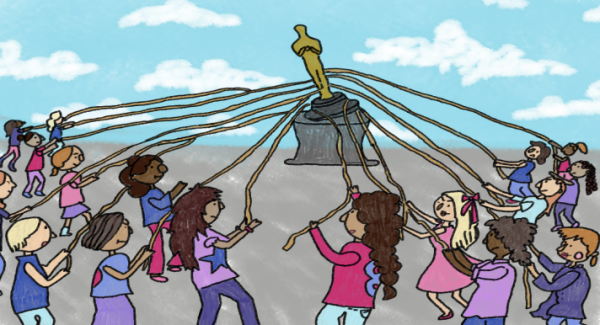
On January 7, the 81st Golden Globes ceremony was held, with a viewership number of 9.4 million, according to Nielsen Statistics. Even those who didn’t tune in to CBS found ways to watch, as clips from Tiktok went viral, but not necessarily for the best reasons.
Hosting this year was Jo Koy, a stand-up comedian who delivered, “A horrid, sophomoric mishmash of lazy jokes,” as stated by Vanity Fair. When this year’s host described the highest grossing film of 2023, he reduced it to nothing more than a movie about a “plastic doll with big boobies.” As Koy lifted up movies like Oppenheimer and kicked down movies like Barbie, the tension from the audience was palpable. The sound of momentous laughing, presumably created by a laugh track, contrasted the uncomfortable looks, only deepening the grave that Koy was digging himself into.
Not only was the comedy mordant towards feminism, but the awards themselves served as a bitter reminder that even in the “Year of the Girl”, as NPR calls it, “women cannot seem to win.” Oppenheimer received the highest number of awards of any 2023 movie. Even so, the film follows a pattern that director Christopher Nolan seems to showcase throughout his work: his exclusion of women. Very few female roles were portrayed throughout the movie, despite the fact that Oppenheimer‘s team was full of women who made large contributions to the project. Barbie, however, is a movie written, directed, and produced by women, yet the hard work and primary messages of the movie were undervalued.
Taylor Swift, the subject of one of the stale jokes made by Joy Koy, explains the phenomenon best when describing her song, mirrorball, which debuted at number twenty six on the Billboard Hot 100. Swift explains, “We have mirrorballs in the middle of a dance floor because they reflect light. They are broken a million times and that is what makes them so shiny. We have people like that in society too. They hang there and every time they break it entertains us.” Through the sexism that took the stage during the awards ceremony, Swift’s idea is at the forefront. For years, women have been the subject of ridicule, while their accomplishments are stripped down. For years, celebrities ranging from Britney Spears to Janet Jackson to Kate Winslet have been directly impacted by these jokes. From only the view facing the stage, nothing seems to have changed, but that’s not the case.
Although the misogyny and inequality is still systemic, the response is not. Throughout the 2000s, the majority of the population accepted and even backed up tabloid and television as they tore women’s bodies, relationships, and careers apart. However, with the rise of both social media and movements such as MeToo, the majority of people don’t let sexism slide. Most Tiktoks that have gone viral, for example, are speaking out against Jo Koy’s words, calling the jokes outdated and insensitive. “I think people are just done, especially girls,” says Priyal Chhipa ’26, “They’re basically saying that they’re not going to be the mirrorballs anymore, they’re not going to be okay with being put on a pedestal if it’s in a negative way.” Although it may seem small, backlash is a huge change that signifies that the culture has become different in the past few years. Media is such a huge part of our society, and reflects what values are cherished. Now more than ever, in the age of Barbie, The Eras Tour, and Sofia Coppola movies, it is easy to see how much value is put into movies that represent how women feel.
However, even with backlash, the systemic problems continue. On Tuesday, January 23, the Academy announced their Oscar nominations, and, a surprise to many, both Greta Gerwig, the director of Barbie, and Margot Robbie, the producer and lead actor, weren’t nominated. Of the five directors put forward for their respective award, only one was a woman,a pattern that has been in place, for the most part, since the beginning of the Oscars. Even more of a snub was Ryan Gosling, who played Ken, the supporting role, being nominated in the “Best Supporting Actor”. Even within a movie centering a woman,a movie brought to life by an almost entirely female cast,the man is picked out and portrayed as most important. But will anyone actually be watching the wins?
In 2023, the viewership number was at the third worst in history, with a number of 18.7 million, according to CNBC. Not only that, but the Golden Globes viewership has decreased by about half in the past few years. In 2020, for example, the number of viewers was about 18.3, but in 2021, the number decreased to almost a third, at 6.9 million. Mina Li, ’26, says, “I didn’t even know about the Golden Globes until this week, way after the event. And I don’t know anyone else who actually watched the full thing.” As mediums of communications evolve, certain aspects are left behind as they become stale and out of touch. If the Academy, Golden Globes, and other awards ceremonies don’t modify themselves similarly, they will be left behind for new forms of entertainment that are growing to match societal changes.






